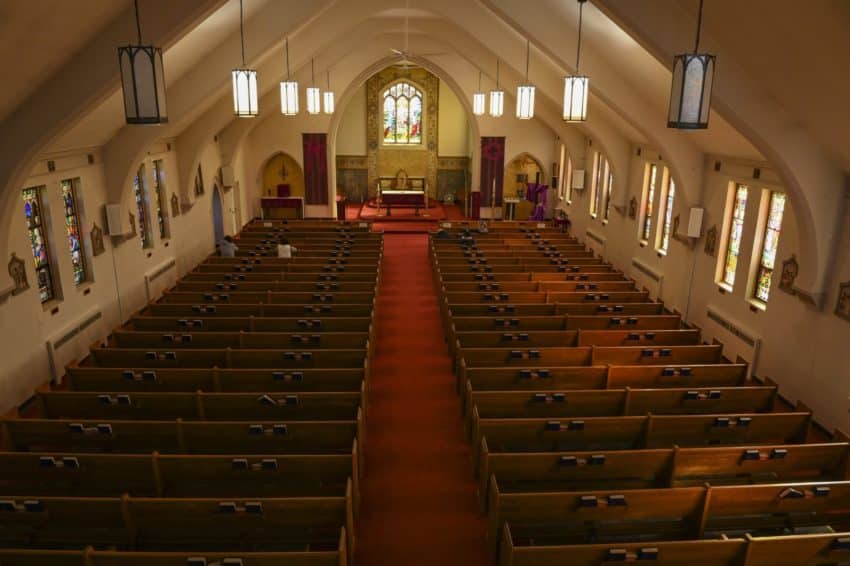
Even Beelzebub must feel sorry for the Catholic Church in Australia. Beset externally by enemies in the media, politics and what passes for the intelligentsia, it now has its own self-righteous fifth column.
These worthies like to describe themselves as “reformers”, but they want to reform the Church the way woodworm reforms a house. They really are demolitionists, hoping to clear away the existing Church, and replace it with one in their own image.
On 18 November, the demolitionists had their electronic clan-gathering, grandly titled a “Convocation” around “The Future of Catholicism in Australia”.
It drew attendees from all the groups composing the Australian Catholic Coalition for Church Reform, including various gaggles of “concerned” Catholics, “inclusive” Catholics, and WWITCH, a curiously named Catholic women’s group.
The website is very proud that 1500 people participated. To put this in context, the last census revealed 5,210,000 Catholics, so that is a whopping 0.03 per cent. Or for further comparison, outside COVID, 3,000 people visit St. Mary’s Cathedral in Sydney each day. A quarter of a million attended Pope Benedict’s World Youth Day Mass at Randwick in 2008.
“Their immediate aim seems to be to hijack the Plenary with a view to first embarrassing the Australian Bishops, and then the universal Church.”
So why would one worry about this micro-swarm of gnats? Mainly because, in the wake of the appalling scandal over Church child abuse, some Bishops are briskly walking scared.
Counter-intuitively, dedicated demolitionists are appointed to prominent Church bodies, and are influential in the current Plenary Council.
This is ironic, because the main agenda of the demolitionists is to demote the Bishops. The chief episcopal crime has been a critical failure in “governance”.
Governance has been a constant theme of the demolitionists since luminaries on the Truth Justice and Healing Council joined with the Royal Commission that it was supposed to be monitoring to identify bad governance as one of the prime causes of child abuse.
This had enormous tactical advantages, as the Bishops are the governors of the Church. Therefore, the horrors of child abuse were their fault. It often seemed worse to be a Bishop than a child-abusing priest, cleric or layman.
The influence of the Bishops consequently should be greatly diminished in favour of responsible laypeople. Guess who?
Make no mistake about it: this is not a People’s Revolution. Rather, in the tradition of the French Revolution, the high bourgeoisie want to displace a perceived episcopal aristocracy.
The new order will be composed of laypeople already holding high office in Catholic health, social services or education. Ordinary parishioners need not apply.
The result will be a sort of collarless clericalism. We will be ruled by grey-haired men – and a few women – who express and enforce correct ecclesial thought.
Dissenters will be dismissed as reactionary, out-of-date or irrelevant.
The watchword of demolitionists is “synodality”, which actually means collective and discerning decision-making – within the bounds of doctrine and canon law – but has been appropriated by demolitionists as a sort of self-guided democracy.
The Church, of course, is not a democracy, though it is a community. Within that community, Popes, Bishops, clerics and the laity play different, but complementary roles.
One amusing thing about the demolitionists is their utter misconception of Church governance. They have imbibed the jungle-juice of the Royal Commission, which could only analogise implausibly between the Church and commercial corporations. Demolitionists like this, because they can equate lay-people with voting shareholders.
The real analogy is with great statutory corporations, which pursue defined public goods. Within such corporations, there are officers with mandated legal duties of leadership and responsibility, which they cannot shed. Much too like Bishops.
Perhaps this error is unsurprising, given that the demolitionists’ own history of good governance is mixed. For example, in the wake of the report of the Truth Justice and Healing Council, the sonorously named Governance Review Project Team produced – unrequested and to almost universal surprise – a 200-page report entitled The Light from the Southern Cross.
The evident intent of this report was to pre-empt as many issues as possible at the up-coming Plenary, a course that has been vigorously prosecuted since. When the Bishops failed immediately to release the report, it providentially was leaked to the French Catholic newspaper, La Croix.

Structurally, the demolitionist agenda is nothing if not ambitious. Diocesan Councils would be “consulted” by Bishops, but in practice would dictate. They would have a profound influence in the choice of Bishops. Lay people would serve on the Australian Bishops Conference.
Beyond structure, the great Gospel injunction remarkably is turned on its head. We are to be of the world, not in it. The fact that secular arrangements are not reflected in the Church is itself proof the Church is wrong.
So, inclusivity is the rallying cry of the demolitionists. An LGBTQI agenda should be prosecuted, the divorced emancipated, and women should be promoted, and preferably ordained as priests.
The Church’s treatment of the sexually diverse, the divorced and women often has been lacking and must be improved. But this omnibus agenda is so intensely Woke that it is insomniac.
Perhaps most astonishingly, the demolitionists propose to redefine what it is to be Catholic.
Ours is a sacramental Church, where service marches inseparably beside the sacraments, the practical with the luminous. Demolitionists are not so keen on the defining nature of the sacramental.
Repeatedly, they argue that it is service alone that truly defines being “Catholic”. Attending Mass or partaking of the Eucharist really are incidental. Apparently, this is all part of the Church reflecting the “real world”.
The fact that much of their agenda could not possibly pass muster in Rome does not bother the demolitionists. Their immediate aim seems to be to hijack the Plenary with a view to first embarrassing the Australian Bishops, and then the universal Church.
The irony is that there is a perfectly achievable and worthwhile agenda of ambitious reform available to the Australian Church: internally, a revision of priestly training, education for leadership of both priests and bishops, and a revival of flagging religious education. Externally, why not publicly commit ourselves to an “Assault of Mercy” on the highest hills of injustice: those occupied by the aged, the mentally ill and indigenous people?
Or we could adopt the arid, internal, self-conscious agenda of the demolitionists. And watch our Church die.
Related Stories:
